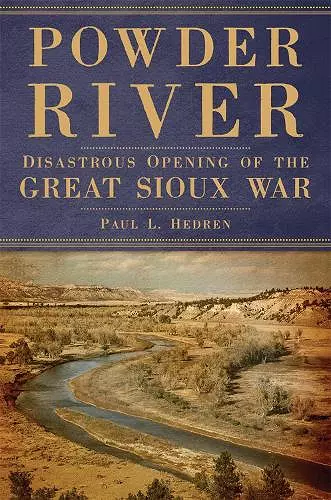Powder River
Disastrous Opening of the Great Sioux War
Format:Paperback
Publisher:University of Oklahoma Press
Published:30th Jul '18
Currently unavailable, and unfortunately no date known when it will be back

The Great Sioux War of 1876-77 began at daybreak on March 17, 1876, when Colonel Joseph J. Reynolds and six cavalry companies struck a village of Northern Cheyennes - Sioux allies - thereby propelling the Northern Plains tribes into war. The ensuing last stand of the Sioux against Anglo-American settlement of their homeland spanned some eighteen months, playing out across more than twenty battle and skirmish sites and costing hundreds of lives on both sides and many millions of dollars. And it all began at Powder River.
Powder River: Disastrous Opening of the Great Sioux War recounts the wintertime Big Horn Expedition and its singular great battle, along with the stories of the Northern Cheyennes and their elusive leader Old Bear. Historian Paul Hedren tracks both sides of the conflict through a rich array of primary source material, including the transcripts of Reynolds's court-martial and Indian recollections. The disarray and incompetence of the war's beginnings - officers who failed to take proper positions, disregard of orders to save provisions, failure to cooperate, and abandonment of the dead and a wounded soldier - in many ways anticipated the catastrophe that later occurred at the Little Big Horn.
Forty photographs, many previously unpublished, and five new maps detail the action from start to ignominious conclusion. Hedren's comprehensive account takes Powder River out of the shadow of the Little Big Horn and reveals how much this critical battle tells us about the army's policy and performance in the West, and about the debacle soon to follow.
Paul Hedren's study of the Crook-Connor campaign affords compelling new assessments about the Great Sioux War of 1876 - 1877. Teeming with fresh data and analysis, Powder River embodies the most significant contribution on this topic to appear in decades."" - Jerome A. Greene, author of American Carnage: Wounded Knee, 1890
""Paul Hedren's Powder River is the definitive examination of the disastrous battle that opened the Great Sioux War. The research is extraordinarily deep and broad, and the conclusions persuasive. Hedren pronounces judgment on culpable officers, and rightly finds little to praise among anyone else."" - Robert M. Utley
""Passages in Powder River ought to show up in anthologies of the best military writing for the next hundred years: beautifully precise accounts of the confusion of battle, the onset of fear and panic, small errors with big consequences - the sort of thing Clausewitz described as the 'friction' of war. From the battle's first shot, things went wrong, and Paul Hedren, a historian at the top of his game, explains why. This is a model of military narrative at its most compelling."" - Thomas Powers, author of The Killing of Crazy Horse
""With twenty years of research, including new primary sources from the Northern Cheyenne tribe, Powder River will now be considered the definitive work on the subject."" - True West Magazine
""Hedren brilliantly resets the framework of Col. Reynolds' attacks on the Northern Cheyenne village and their influence on the short- and long-term consequences of the battle on the Great Sioux War, the Northern Plains tribes, the officer corps of the U.S. Army, and the settlement of the northern tier of Western states and territories."" - True West
""With detailed appendixes, a thorough use of sources, and an incisive style, Paul L. Hedren's Powder River succeeds in providing its readers with a provocative rethinking of the Great Sioux War in its earliest months."" - Montana The Magazine of Western History
""Readers will be haunted by Hedren's account of the frigidity of the plains in winter, the confusion of the dawn attack, the sense of the futility faced by the soldiers, and the callousness and bickering of the men who led this disaster."" - New Mexico Historical Review
""[Powder River] flows like a novel. Details about campaigning in subzero temperatures, with little food and little sleep, enliven the narrative and remind readers of the sacrifices of nineteenth-century soldiers. Hedren strengthens his account by including the Indians' perspective of the battle . . . and historical context."" - On Point: The Journal of Army History
ISBN: 9780806161891
Dimensions: 229mm x 152mm x 28mm
Weight: 699g
472 pages